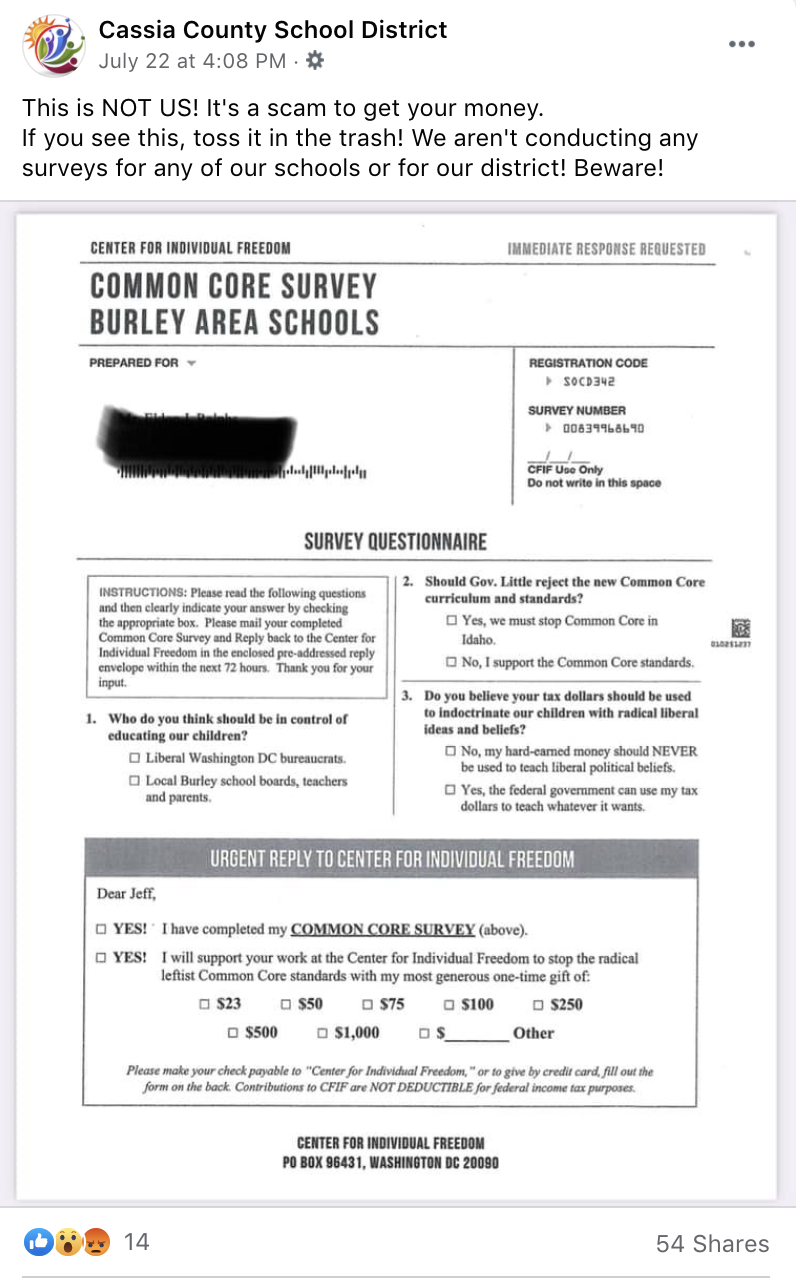The first survey appeared in Cassia County residents’ mailboxes sometime in mid-July, full of leading questions and urgent rhetoric.
The topic: Common Core in Burley area schools.
“Immediate response requested,” it said. “Should Gov. Little reject the new Common Core curriculum and standards?”
A second survey followed. This one accompanied by a long letter accusing liberals of ripping God from schools and adding “pro-Islamic lessons.”
“Should students be punished for mentioning God in schools?” the second survey asked. “Do you agree that we must stop the war against God and our Judeo-Christian values?”
Cassia County residents have been hit with a series of odd snail-mail surveys over the summer, from groups soliciting donations in their fights against “radical leftist Common Core” or the “indoctrination and intimidation from Islamic radicals.” At the bottom of each survey was a suggested donation box: Could patrons send $23 — $1,000 or more to help the cause?
Debbie Critchfield, Cassia County School District spokeswoman, said the surveys came out of the blue. There are no “new” Common Core standards in Idaho schools (though the debate over Common Core seemingly repeats itself annually and legislators will review Idaho’s curriculum standards in 2022). And Critchfield says she’d never heard any concerns about Islam being taught in area schools — the district doesn’t even offer a course on world religions like the kind students might take in college, she said.
“It was odd, like, ‘OK, where did this come from?’ And then to have specific references to our district and to our governor, I thought that was interesting,” Critchfield said. “When you start using enough terms to give it some legitimacy, that’s how people get it opened up and before you know it, you’re believing something that isn’t happening, or you’re concerned about something that may or may not be true.”

The school district only learned of the surveys when district patrons brought them into the office, Critchfield said. Administrators decided to post pictures on Facebook, to warn taxpayers that the surveys were not coming from the district, and the district wasn’t asking for their money.
The mailings say they were paid for by the Center for Individual Freedom and the David Horowitz Freedom Center, conservative nonprofits based on either coast.
Government transparency group the Sunlight Foundation lists the Center for Individual Freedom as a “dark money” group — a nonprofit that spends money on political activity, but doesn’t have to disclose the donors who are funding those efforts. The center has been involved in the fight to roll back campaign disclosure rules, Mother Jones reported, and funded advertisements against Congress’ debt relief plan for Puerto Rico in 2016.
The Southern Poverty Law Center lists Horowitz as a “driving force of the anti-Muslim, anti-immigrant and anti-black movements.” Horowitz’ website also links to a campaign to “stop K-12 indoctrination,” linked to the political movement to target alleged liberal teachings and the discussion of critical race theory in schools. In a letter attached to the second survey, the Horowitz Foundation says it aims to collect more than 2 million surveys, “which equals 150 surveys for each and every school district in the U.S.”
But Andy Grover, president of the Idaho School Administrators Association, and Quinn Perry of the Idaho School Boards Association said they haven’t seen any similar mailings targeting other school districts.

So, why Cassia County?
The Center for Individual Freedom and Horowitz foundation did not immediately respond to EdNews’ messages asking that question.
“I have a hard time thinking it’s random, to get them back to back like that,” Critchfield said.
Critchfield, a member of the State Board of Education, is also one of two Republican candidates who have announced a bid for the position of state superintendent of public instruction in 2022.
She doesn’t think the letters are related to her campaign.
“I took it that it was 100% about getting money, fundraising for whatever the group was — and they were promoting pressure points that may or may not be in a community,” she said.
